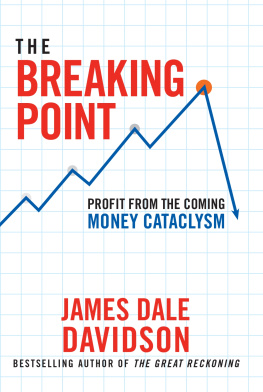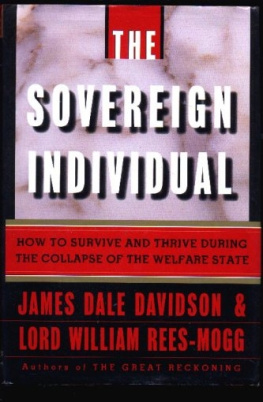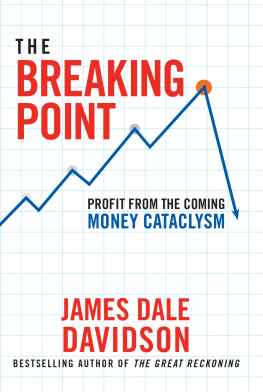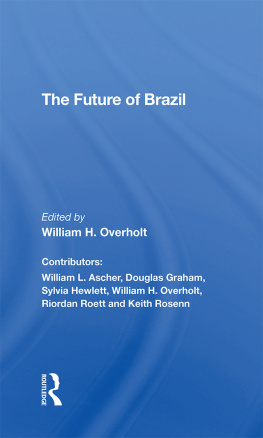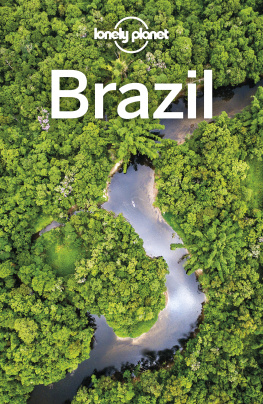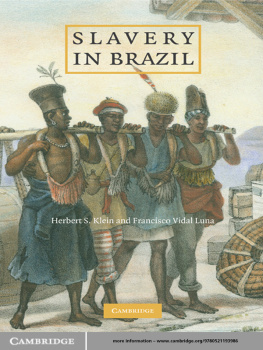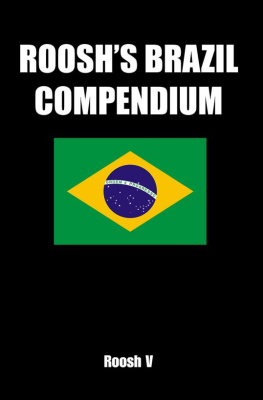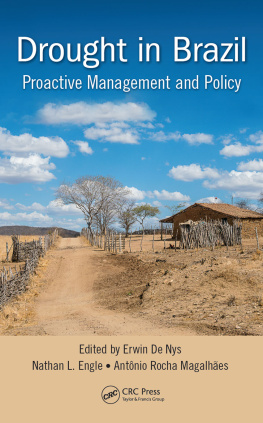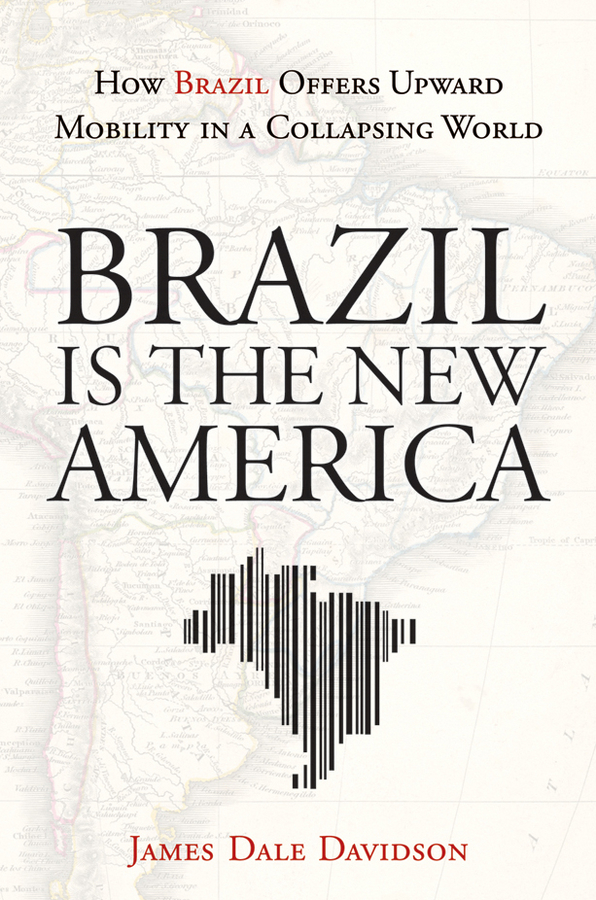Contents

Copyright 2012 by James Dale Davidson. All rights reserved.
Published by John Wiley & Sons, Inc., Hoboken, New Jersey.
Published simultaneously in Canada.
No part of this publication may be reproduced, stored in a retrieval system, or transmitted in any form or by any means, electronic, mechanical, photocopying, recording, scanning, or otherwise, except as permitted under Section 107 or 108 of the 1976 United States Copyright Act, without either the prior written permission of the Publisher, or authorization through payment of the appropriate per-copy fee to the Copyright Clearance Center, Inc., 222 Rosewood Drive, Danvers, MA 01923, (978) 750-8400, fax (978) 646-8600, or on the Web at www.copyright.com . Requests to the Publisher for permission should be addressed to the Permissions Department, John Wiley & Sons, Inc., 111 River Street, Hoboken, NJ 07030, (201) 748-6011, fax (201) 748-6008, or online at http://www.wiley.com/go/permissions .
Limit of Liability/Disclaimer of Warranty: While the publisher and author have used their best efforts in preparing this book, they make no representations or warranties with respect to the accuracy or completeness of the contents of this book and specifically disclaim any implied warranties of merchantability or fitness for a particular purpose. No warranty may be created or extended by sales representatives or written sales materials. The advice and strategies contained herein may not be suitable for your situation. You should consult with a professional where appropriate. Neither the publisher nor author shall be liable for any loss of profit or any other commercial damages, including but not limited to special, incidental, consequential, or other damages.
For general information on our other products and services or for technical support, please contact our Customer Care Department within the United States at (800) 762-2974, outside the United States at (317) 572-3993 or fax (317) 572-4002.
Wiley also publishes its books in a variety of electronic formats. Some content that appears in print may not be available in electronic books. For more information about Wiley products, visit our web site at www.wiley.com .
Library of Congress Cataloging-in-Publication Data:
Davidson, James Dale.
Brazil is the new America : how Brazil offers upward mobility in a collapsing world / James Dale Davidson.
p. cm.
Includes index.
ISBN 978-1-118-00663-4 (cloth); ISBN 978-1-118-22175-4 (ebk);
ISBN 978-1-118-26041-8 (ebk); ISBN 978-1-118-23556-0 (ebk)
1. Economic developmentBrazil. 2. Economic developmentUnited States. 3. Economic forecastingBrazil. 4. Economic forecastingUnited States. 5. BrazilEconomic conditions21st century. 6. United StatesEconomic conditions21st century. 7. BrazilSocial conditions21st century. 8. United StatesSocial conditions21st century. I. Title.
HC187.D38 2012
330.981dc23
2012010364
To my Brazilian son, Arthur Leonardo DeClare Davidson
Preface
The first decade of the twenty-first century has taught me a lesson. I now realize that I was hasty to be cocky half a lifetime ago about having been born in the United States.
When I was a young man, the American Dream was alive and well. I took advantage of it to invent my own work as a serial entrepreneur. I have had a hand in launching and building three billion dollar-plus companies, two companies that attained a market cap of half a billion dollars or more, and about a dozen others that became worth $100 million or more. I enjoyed the adventure and the high standard of living that went with it. But I dont see the same opportunities ahead for my children, especially my two older children who are entirely American as I was.
By no means am I selling them short. They are both bright and energetic. They will need all the energy they can muster to succeed in the world in which they will live.
My youngest child has better prospects. He is a Brazilian citizen who speaks fluent Portuguese and is already learning Mandarin, to go with Spanish, French, and English in his language repertoire. Touch wood, he seems to have a bright future as a global citizen, more because his mothers family includes some well-connected and successful Brazilians than because of his connections to the United States.
Most Americans are ignorant of Brazil. Many might be inclined to consider it an Hispanic country. Or guess that its capital is Buenos Aires. Equally, many would be inclined to suppose that Brazil is a small, poor country. I remember my astonishment several years ago when a very wealthy Brazilian woman of my acquaintance took a fancy to a house in McLean, Virginia, that was for sale by its owner. When the owner learned that the proposed buyer was Brazilian, he arrogantly announced that he would take the discussion no further because a Brazilian could not possibly afford his house. What an idiot. Now I live in South Florida, where newspapers report that up to half of all real property transactions in Miami in 2011 were conducted with Brazilians for cash.
We Americans believe ourselves to be rich. For our entire lives, we have been told that the United States is the richest country on earth. Many of us who cast uneasy glances into the future anticipated that sometime in the by-and-by the unrealistic promises made to pay Social Security and Medicare benefits would come to grief. We were optimists. That someday is not decades away, but the day after tomorrow. Thinking superficially, we have supposed as Americans that we were far richer than Brazilians. No longer.
A little-noted report from the United States Treasury in August 2011 showed that the U.S. government owes $210 billion or approximately $1,034 per capita to Brazilians ($4,138 per Brazilian household). How many American households bear this burden could be debated. According to the U.S. Census Bureau, there are approximately 113,000,000 U.S. households, but only 97 million households are above the poverty line. Those who are already destitute have no capacity to pay the governments vast obligations. Another 18 million households are retired and no longer producing goods and services that can be used to support the governments obligations. That leaves approximately 79 million, nonretired, apparently solvent households to pay the staggering burdens left behind by economic collapse. On average, therefore, each productive household in the United States will owe the average Brazilian $2,658. The world is changing faster than we think.
This book is an attempt to explain how and why the world is changing, with respect to the other great, continental American economy, Brazil.
Acknowledgments
I thank the many persons whose thoughts entertained and provoked me as I got to know Brazil. The works of many of the published authorities are cited in the text. In particular, I found Austrian novelist Stefan Zweigs classic, Brazil: A Land of the Future , to be far-seeing and informative.
I was especially lucky in having the support and encouragement of Romualdo Concado, who graciously allowed me to roost in the guest room of his home in Belvedere, Belo Horizonte. He is not only a great host; he is also a well-informed observer of the Brazilian economy. He entertained me with stories about why Brazil is no country for beginners. He generously read early drafts of some of the chapters and saved me from embarrassing mistakes. I also thank Cristina Barbosa for her spirit-lifting encouragement and her perspectives on the trials of dealing with Brazilian bureaucracy. I also thank my sometimes co-author, Lord William Rees-Mogg, for his encouragement. And cheers to my personal assistant, Laurie Geller, for braving tottering stacks of notes, books, and drafts to keep me organized in the writing process.


